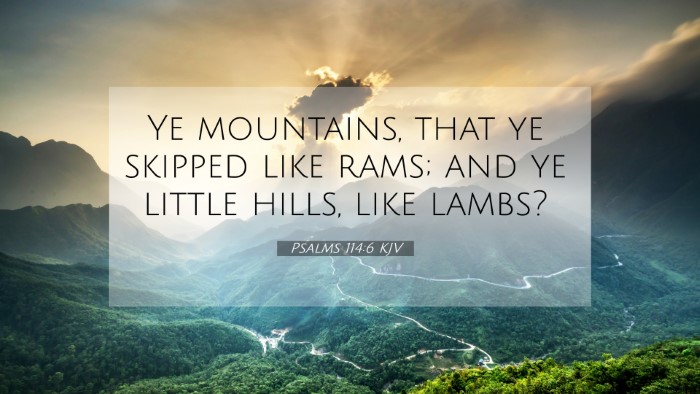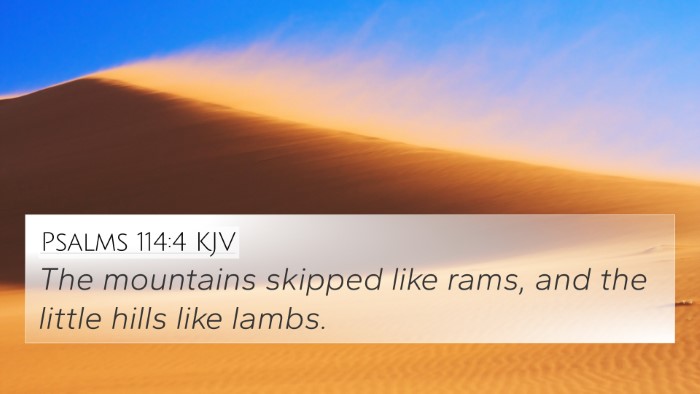Psalms 114:6 - Understanding the Verse
Psalms 114:6 states, "Ye mountains, that ye skipped like rams; and ye little hills, like lambs?" This verse from the Book of Psalms addresses the natural world's response to the presence and power of God.
Meaning and Interpretation
The verse poetically describes the mountains and hills acting as if they have life and agency, responding with exuberance at the arrival of God's people. This imagery demonstrates not just the physical phenomena of nature but also its spiritual significance. According to Matthew Henry's Commentary, this represents the reverence of nature before the majesty of God and highlights God's authority over creation.
Adam Clarke elaborates that this verse signals the miraculous events that surround Israel's liberation and journey, showing how nature seemed to participate in the Israelites' exodus. This connection emphasizes God's active role in guiding His people and the awe-inspiring effects of divine intervention in worldly events.
Albert Barnes interprets this verse in a more classical context, suggesting that the imagery of mountains and hills leaping communicates the joy of the creation in response to salvation and deliverance. This reveals a deep thematic connection in the Bible regarding how creation reflects God's glorious works.
Thematic Connections
This verse can be seen in light of several key themes in scripture:
- God's Sovereignty over Creation: Psalms 114:6 illustrates that all creation acknowledges God's power. Related verses include Job 38:4-7, which describes the creation of the earth.
- Deliverance: As God liberates His people, nature responds. This is echoed in Isaiah 55:12, where nature rejoices during Israel's redemption.
- Joy in Salvation: The response of creation ties to human joy in salvation. This is seen in Luke 19:40, where Jesus says the stones would cry out if His followers were silent.
- God's Presence: The idea that mountains and hills react to God’s presence parallels Exodus 19:18, describing Mount Sinai's shaking at God's descent.
- Creation's Groaning: Romans 8:19-22 illustrates how creation waits eagerly for the revelation of the sons of God, implying that creation is aware of God’s workings.
- Nature in Worship: Creation itself is shown as a participant in worship, reflected in Psalms 148, where all creation praises God.
- Symbolism of Mountains: Mountains in the Bible often represent strength and permanence, contrasting with their depicted movement in this verse, suggesting a God even over the seemingly immovable.
- Prophetic Imagery: Prophets often use nature to illustrate God’s message; this can be seen in Isaiah 40:4 where valleys are exalted and mountains made low.
Cross References
This verse connects with the following Bible verses:
- Exodus 14:21-22: God's command to the sea, resulting in miraculous parting—the natural world obeys Him.
- Job 12:7-10: Animals and nature bear witness to the wisdom and power of God.
- Isaiah 44:23: Nature rejoices at the redemption of God's people.
- Psalm 96:11-12: The earth and its creatures celebrate God's coming judgment.
- Matthew 8:27: Even the winds and the sea obey Jesus, highlighting His authority over nature.
- Romans 1:20: The invisible attributes of God are seen through the creation, tying back to the response of creation.
- Psalm 47:1: Call to clap hands, emphasizing the joy among creation at God's kingship.
Conclusion
Psalms 114:6 reminds us of the profound connections between the physical world and God's divine authority, urging us to recognize that everything—mountains, hills, and men—responds to God's command. Through cross-referencing this verse with others, we can better understand the thematic tapestry that the Bible presents regarding God's power, the joy of deliverance, and the profound interaction between the creator and His creation.
Further Study and Reflection
As you reflect on this verse, consider using tools for Bible cross-referencing to explore the connections further. Resources such as a Bible concordance or a cross-reference Bible study guide can provide enriched understanding and help you identify themes that resonate across the scriptures.




